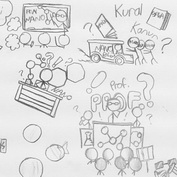- Details
- Written by Dimitris Stavrou, University of Crete
The Responsible Research and Innovation framework consists of 6 keys (European Commission, 2012). These keys are taken into account in the Greek module as follows:
- Details
- Written by Sevil Akaygün, Bogazici University
In the first lesson of the module, based on the imaginary scenario, a brochure that introduces the probable nano silver products is given to the students (see below). A hospital that is on the face of deciding on adapting such products establishes a committee to explore the benefits and risks of such products.
Read more: RRI in the turkish module focusing on nanotechnology applications in health sciences
- Details
- Written by Ana Maria Aurelia Petrescu, Valahia University Targoviste
The 6E Model requires a design and implementation of a training approach in 6 steps/stages, in which the teacher creates a stimulating learning environment focused on investigation, research, experimentation and discovery, placing the student in the position of responsible researcher. This approach facilitates a relevant and sustainable learning, qualitative and objective, in the process of forming and developing students’ skills necessary for optimal socio-professional insertion.
- Details
- Written by Rita Marques, Universidade de Lisboa
One of the advantages of both producing and presenting an exhibit is that it draws upon the facets of IBSE: in producing an exhibition pupils can re-present scientific facts as speculative questions, transmissive teaching can be transformed, and the audience at the exhibit can construct their own learning.
- Details
- Written by Dimitris Stavrou, University of Crete
In Greece, five highly qualified and experienced teachers (one primary teacher, two physics teachers and two chemistry teachers) participated as active members in a ''Community of Learners'' (CoL). Two science education researchers, two nanoscience researchers and three science museum experts supported the CoL. Since the members of the CoL are located in different parts of Greece, teleconferences and face to face workshops were used in order to facilitate the collaboration and exchange of ideas and materials.









